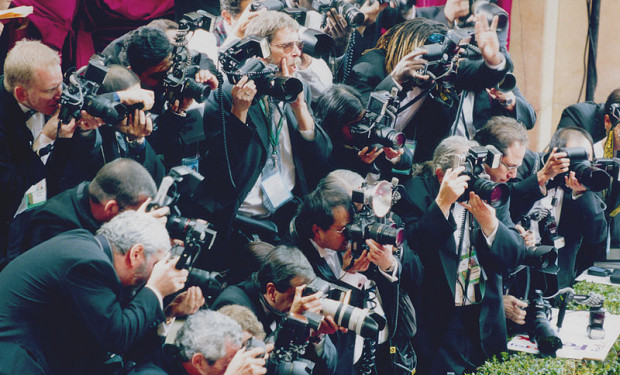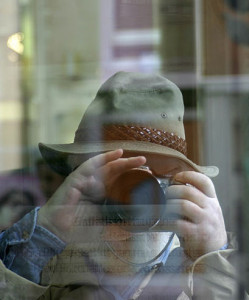Are celebs’ babies finally free to roam the streets of L.A. in peace?
California’s new anti-harassment law has good intentions in penalizing those who harass celebrities’ children, but may potentially target the wrong people.
Celebrity news may have just become more expensive to produce in California, and it seems that the world of fame and fortune may have just become a little easier for certain Californians to endure. California Bill SB 606, which was signed by Governor Brown on September 24, 2013, makes it a misdemeanor to “intentionally harass” another person’s child because of what that person does for a living. Which group of employees’ children is likely to be the primary beneficiaries of this new protection? The children of celebrities whose lives and exploits keep magazines the world over well-stocked with stories.
This law has the best of intentions: it recognizes that the children of celebrities did not ask to be thrust into the spotlight. These children are exposed to this attention only because of their parents. While the law addresses all citizens, the law seems designed to make members of the paparazzi in particular consider carefully how they interact with the children of celebrities.
The punishments that this new legislation inflicts are fairly severe. For the first violation of this statute, the person will be subject to a $10,000 fine or jail time lasting up to a year. For a second conviction, the total fine increases to $20,000 and is accompanied by a period of jail time greater than five days but less than a year. A third conviction comes with a fine of $30,000 and time in jail greater than thirty days but less than a year.
A jury may feel more sympathetic toward a celebrity with whom they are familiar than toward a member of a profession infamous for harassing conduct.
This law is problematic because whether there is a chargeable offense depends largely on the sensibilities of the victim. A person is prohibited from conduct that “seriously alarms, annoys, torments, or terrorizes the child and that serves no legitimate purpose.” The statute gives no guidance, however, as to what this means apart from a passing mention of following the child’s activities or lying in wait. The lack of guidance leads to difficulty in determining what conduct is prohibited under the statute and what is allowed. What would be considered a legitimate purpose is likewise unclear from the language of the statute. The argument could be made that it is a legitimate purpose to take pictures in order to sell them later, especially when one makes her livelihood as a photographer. If this were the case, then even the most overzealous member of the paparazzi may be exempt from this statute.
The law attempts to mitigate the subjectivity with which the conduct is viewed by stating in the definitions section that the conduct, while actually causing the victim to suffer substantial emotional distress, must also be such that would cause a reasonable person to suffer emotional distress. Were the issue to reach a jury, jurors may be more likely to believe and feel sympathy toward a celebrity with whom they are familiar rather than a member of a profession that is infamous for potentially harassing conduct.
In the case of celebrities, more eyes are upon them when they step out into the public.
In addition, this law may be unnecessary because California’s civil law already provides financial recovery for a victim who experiences conduct of this nature. First, California recognizes the tort of intrusion upon seclusion, which prohibits someone from interfering with another person’s privacy in a way that crosses a line of decency. A person is liable for intrusion upon seclusion “who intentionally intrudes, physically or otherwise, upon the solitude or seclusion of another or his private affairs or concerns, [and] is subject to liability to the other for invasion of his privacy, if the intrusion would be highly offensive to a reasonable person.” No law on the books, however, allows for a right to sue for infringements upon one’s right to privacy once a person leaves her home. Outside of the home, everyone potentially is in the public eye; the only difference in the case of celebrities is that more eyes are upon them for longer periods of time.
Additionally, if conduct by the paparazzi reaches the level of threatening behavior that the law envisions, the solution appears to exist already in the form of another tort claim: intentional infliction of emotional distress. This tort compensates people who have been the victims of extreme and outrageous conduct that goes beyond all sense of decency. It must first be proven that the defendant’s conduct was extreme and outrageous and that the defendant either acted with the intention of causing or with reckless disregard as to the probability of causing emotional distress in the plaintiff. Second, the plaintiff must have actually suffered severe or extreme emotional distress. Lastly, it must be shown that the cause of the emotional distress in the plaintiff was the defendant’s outrageous conduct.
The combination of successful tort claims for intentional infliction of emotional distress and intrusion upon seclusion could result in the victims’ damages award far exceeding the criminal fines that are levied for a violation of California Bill SB 606. A criminal conviction, even if subjecting the offending paparazzo to a lesser monetary payment, is a much greater deterrent than the threat of a civil lawsuit—especially with the additional potential threat of jail time.
Importantly, the new law does stand apart from the above torts in that it offers greater protection for children specifically. Most people would be uncomfortable if they were followed everywhere they went from the minute they stepped outside. A child, however, may not have the courage to respond to such unwelcome attention from adults by asking them to stop what they are doing. The new law’s efforts at deterrence of the paparazzi, therefore, gives voice to the feelings of children that they may not otherwise be able to articulate.
The chief proponents of this law are looking for safety and security that are not likely to result from this law.
But then, what does a monetary award really benefit a celebrity parent who is already wealthy? What celebrity parents like Halle Berry and Jennifer Garner are really looking for is safety and security that are not likely to result from this law. If the threat against celebrity children is a violent stalker posing as a member of the paparazzi, then how does imposing a misdemeanor and a jail sentence of up to a year solve that problem? After only a relatively short period of time spent in prison, the perpetrator would be released and free to pursue the same course of action as before.
Under this statute, a paparazzo who upset a highly sensitive child would be punished more severely than a person who was caught and found guilty of the crime of stalking. A person guilty of stalking in California is subject to a fine of $1,000 or prison time of no more than one year, while a person guilty of violating this law is fined $10,000 or jailed for up to a year—with subsequent violations including a fine and time in prison. Perhaps a better solution to the threats that are enumerated in the new law are either celebrities hiring better security to protect themselves and their families or increasing the punishment that is inflicted by the stalking statutes. Penalizing the crime of stalking more severely would benefit all members of society, not just the children of Hollywood.
All parents seek the best interests of their children and want to protect them as much as possible. Part of growing up, however, involves experiencing the world and interacting with people on terms that they cannot always control. The constant argument in favor of the law by its celebrity proponents is to think of their children’s well-being. The truly reckless members of the paparazzi, however, are not likely to be deterred from scrambling to get the next picture of a famous celebrity’s child.








